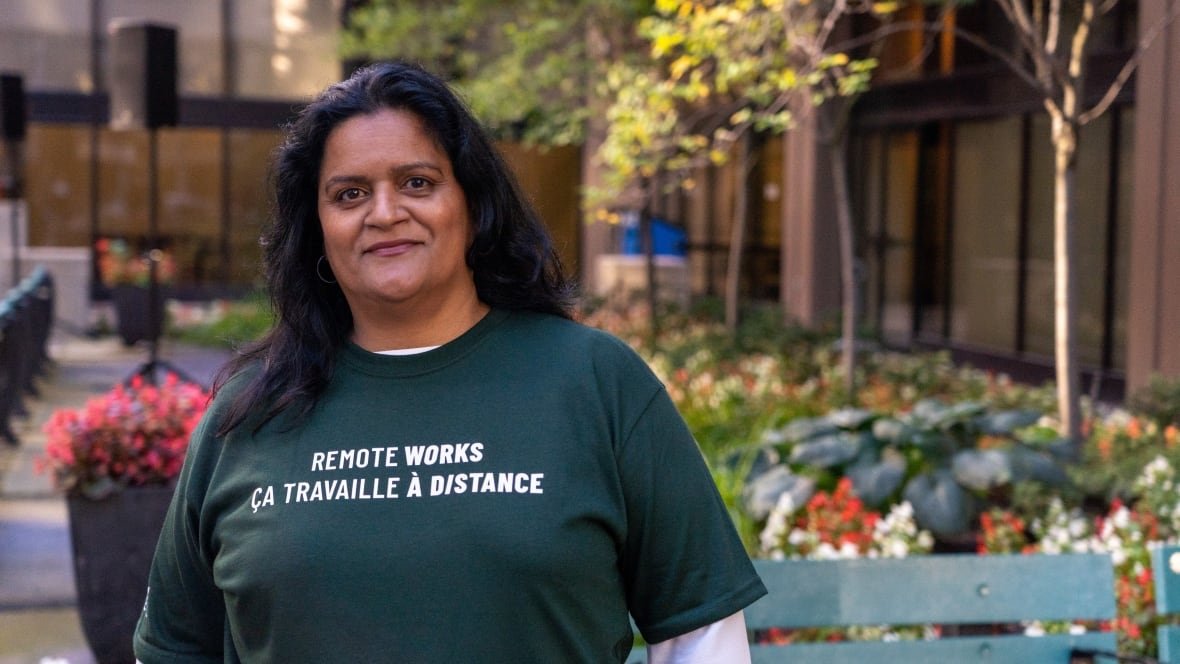Conservative Leader Pierre Poilievre says a government led by him would cut the number of federal public servants — but he doesn’t mind if they work from home.
When asked by Radio-Canada on Tuesday if U.S. President Donald Trump’s executive order sending federal workers back to the office five days a week is a good idea, Poilievre said that what matters is whether public servants do the work.
He said that work is not getting done now within the federal government, though he did not go into detail about public servants’ productivity.
A Parliamentary Budget Officer report that analyzed Departmental Results Reports data between 2018-19 and 2021-22 found that, on average, nearly a quarter of federal performance targets were not met annually.
There have been chronic delays in recent years for services like passports and immigration applications.
Poilievre called for public servants to be given clear assignments and be monitored to ensure they’re completing their tasks.
He said he would also cut the federal public service, arguing that Canada has far too many bureaucrats.
Size of civil service has increased since 2015
Poilievre said the federal Liberals drove up the deficit in part by hiring 110,000 public servants.
The Canadian Press asked Poilievre and his team how many public servants he would drop, what type of monitoring methods he thinks should be in place and whether he would end the mandate requiring public servants to work in person at least three days a week. They have not yet replied.
According to the Government of Canada website, the size of the public service has grown from 257,034 workers in 2015 to 367,772 in 2024.
Before this week, Poilievre had largely avoided the topic of remote work.
When asked about the issue in May, Poilievre responded by criticizing Prime Minister Justin Trudeau over the size of the public service and said “everyone should be working five days a week.” His spokesperson later clarified that his comment was not about being in offices and that the Conservatives want the public service working five days a week “as they already are.”
The federal government’s latest remote work mandate, which took effect in early September, requires all staff employed under the Treasury Board to work on site a minimum of three days a week. For executives, the expectation is that they work in the office four days a week.
Many federal employees and unions have responded by holding rallies, filing complaints and submitting grievances. The Public Service Alliance of Canada (PSAC), the largest federal public-sector union, has filed a challenge of the new rules in Federal Court.
PSAC national president Sharon DeSousa said in a media statement that “remote work is the future of Canada’s public service,” adding that it reduces traffic and pollution and could save the government money by allowing it to sell buildings.
DeSousa said that if Poilievre is looking to cut costs, he should be looking at reducing government outsourcing.
“Reckless public service cuts will always cost more in the long run, and it’s the people who depend on these vital public services who ultimately pay the price,” she said. “We have one of the best public services in the world, and it’s common sense that fewer people helping a growing population isn’t going to solve the problems families are facing today.”

Canadian Association of Professional Employees president Nathan Prier said the union is “disappointed” with Poilievre’s comments.
“It is shocking to see how little he knows about the federal public sector and how little he thinks of federal employees despite a decades-long career in federal politics,” Prier said. “It is also irresponsible to be talking about arbitrary downsizing when we need to ready ourselves to stand up to the U.S. giant next door. A strong federal workforce is our best defence against (U.S. President Donald) Trump.”
To reduce costs and boost productivity, Poilievre should prioritize repealing the return-to-office mandate and focus on modernizing government infrastructure, said Prier.
“If he believes things aren’t getting done, the root of the problem lies in outdated management approaches, bloated senior management ranks and a record-shattering overreliance on costly and nepotistic private contractors,” he said. “What the federal workforce truly needs is a leader who invests in recruiting and retaining top talent for the work that needs to be done, not someone who is mostly indistinguishable from Elon Musk in his plans for the public sector.”
At a press conference on Wednesday, NDP Leader Jagmeet Singh said Poilievre’s comments about the public service offer proof that he’s “not a friend of working people.”
He said cuts to public service jobs would hurt workers, their families and regions across the country.





